马丁路德金的英文简介
- 格式:ppt
- 大小:4.61 MB
- 文档页数:37
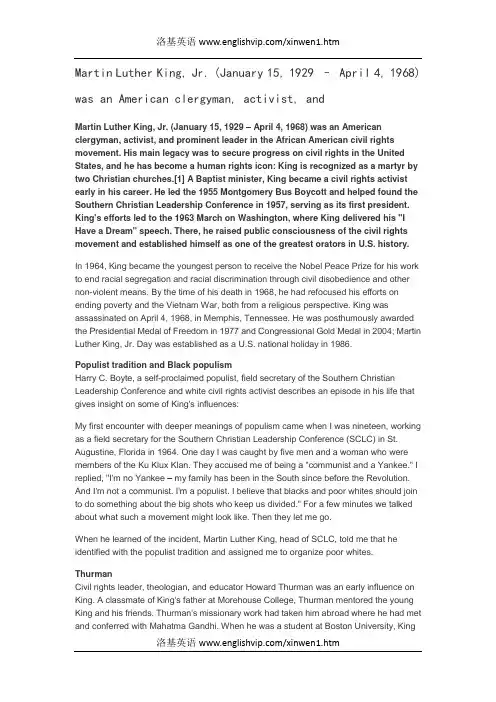
Martin Luther King, Jr. (January 15, 1929 – April 4, 1968) was an American clergyman, activist, andMartin Luther King, Jr. (January 15, 1929 – April 4, 1968) was an American clergyman, activist, and prominent leader in the African American civil rights movement. His main legacy was to secure progress on civil rights in the United States, and he has become a human rights icon: King is recognized as a martyr by two Christian churches.[1] A Baptist minister, King became a civil rights activist early in his career. He led the 1955 Montgomery Bus Boycott and helped found the Southern Christian Leadership Conference in 1957, serving as its first president. King's efforts led to the 1963 March on Washington, where King delivered his "I Have a Dream" speech. There, he raised public consciousness of the civil rights movement and established himself as one of the greatest orators in U.S. history.In 1964, King became the youngest person to receive the Nobel Peace Prize for his work to end racial segregation and racial discrimination through civil disobedience and other non-violent means. By the time of his death in 1968, he had refocused his efforts on ending poverty and the Vietnam War, both from a religious perspective. King was assassinated on April 4, 1968, in Memphis, Tennessee. He was posthumously awarded the Presidential Medal of Freedom in 1977 and Congressional Gold Medal in 2004; Martin Luther King, Jr. Day was established as a U.S. national holiday in 1986.Populist tradition and Black populismHarry C. Boyte, a self-proclaimed populist, field secretary of the Southern Christian Leadership Conference and white civil rights activist describes an episode in his life that gives insight on some of King's influences:My first encounter with deeper meanings of populism came when I was nineteen, working as a field secretary for the Southern Christian Leadership Conference (SCLC) in St. Augustine, Florida in 1964. One day I was caught by five men and a woman who were members of the Ku Klux Klan. They accused me of being a "communist and a Yankee." I replied, "I'm no Yankee – my family has been in the South since before the Revolution. And I'm not a communist. I'm a populist. I believe that blacks and poor whites should join to do something about the big shots who keep us divided." For a few minutes we talked about what such a movement might look like. Then they let me go.When he learned of the incident, Martin Luther King, head of SCLC, told me that he identified with the populist tradition and assigned me to organize poor whites.ThurmanCivil rights leader, theologian, and educator Howard Thurman was an early influence on King. A classmate of King's father at Morehouse College, Thurman mentored the young King and his friends. Thurman's missionary work had taken him abroad where he had met and conferred with Mahatma Gandhi. When he was a student at Boston University, Kingoften visited Thurman, who was the dean of Marsh Chapel. Walter Fluker, who has studied Thurman's writings, has stated, "I don't believe you'd get a Martin Luther King, Jr. without a Howard Thurman".Gandhi and RustinInspired by Gandhi's success with non-violent activism, King visited Gandhi's birthplace in India in 1959, with assistance from the Quaker group the American Friends Service Committee. The trip to India affected King in a profound way, deepening his understanding of non-violent resistance and his commitment to America's struggle for civil rights. In a radio address made during his final evening in India, King reflected, "Since being in India, I am more convinced than ever before that the method of nonviolent resistance is the most potent weapon available to oppressed people in their struggle for justice and human dignity. In a real sense, Mahatma Gandhi embodied in his life certain universal principles that are inherent in the moral structure of the universe, and these principles are as inescapable as the law of gravitation." African American civil rights activist Bayard Rustin, who had studied Gandhi's teachings, counseled King to dedicate himself to the principles of non-violence, served as King's main advisor and mentor throughout his early activism, and was the main organizer of the 1963 March on Washington.Rustin's open homosexuality, support of democratic socialism, and his former ties to the Communist Party USA caused many white and African-American leaders to demand King distance himself from Rustin.Montgomery Bus Boycott, 1955In March 1955, a fifteen-year-old school girl, Claudette Colvin, refused to give up her bus seat to a white man in compliance with the Jim Crow laws. King was on the committee from the Birmingham African-American community that looked into the case; Edgar Nixon and Clifford Durr decided to wait for a better case to pursue. On December 1, 1955, Rosa Parks was arrested for refusing to give up her seat. The Montgomery Bus Boycott, urged and planned by Nixon and led by King, soon followed.The boycott lasted for 385 days, and the situation became so tense that King's house was bombed. King was arrested during this campaign, which ended with a United States District Court ruling in Browder v. Gayle that ended racial segregation on all Montgomery public buses.March on Washington, 1963King, representing SCLC, was among the leaders of the so-called "Big Six" civil rights organizations who were instrumental in the organization of the March on Washington for Jobs and Freedom, which took place on August 28, 1963. The other leaders and organizations comprising the Big Six were: Roy Wilkins from the National Association for the Advancement of Colored People; Whitney Young, National Urban League; A. Philip Randolph, Brotherhood of Sleeping Car Porters; John Lewis, SNCC; and James L. Farmer, Jr. of the Congress of Racial Equality. The primary logistical and strategic organizer was King's colleague Bayard Rustin. For King, this role was another which courted controversy, since he was one of the key figures who acceded to the wishes of President John F. Kennedy in changing the focus of the march. Kennedy initially opposed the march outright, because he was concerned it would negatively impact the drive forpassage of civil rights legislation, but the organizers were firm that the march would proceed.The march originally was conceived as an event to dramatize the desperate condition of blacks in the southern United States and a very public opportunity to place organizers' concerns and grievances squarely before the seat of power in the nation's capital. Organizers intended to excoriate and then challenge the federal government for its failure to safeguard the civil rights and physical safety of civil rights workers and blacks, generally, in the South. However, the group acquiesced to presidential pressure and influence, and the event ultimately took on a far less strident tone. As a result, some civil rights activists felt it presented an inaccurate, sanitized pageant of racial harmony; Malcolm X called it the "Farce on Washington," and members of the Nation of Islam were not permitted to attend the march.The march did, however, make specific demands: an end to racial segregation in public school; meaningful civil rights legislation, including a law prohibiting racial discrimination in employment; protection of civil rights workers from police brutality; a $2 minimum wage for all workers; and self-government for Washington, D.C., then governed by congressional committee. Despite tensions, the march was a resounding success. More than a quarter million people of diverse ethnicities attended the event, sprawling from the steps of the Lincoln Memorial onto the National Mall and around the reflecting pool. At the time, it was the largest gathering of protesters in Washington's history. King's "I Have a Dream" speech electrified the crowd. It is regarded, along with Abraham Lincoln's Gettysburg Address and Franklin D. Roosevelt's Infamy Speech, as one of the finest speeches in the history of American oratory.AssassinationOn March 29, 1968, King went to Memphis, Tennessee in support of the black sanitary public works employees, represented by AFSCME Local 1733, who had been on strike since March 12 for higher wages and better treatment. In one incident, black street repairmen received pay for two hours when they were sent home because of bad weather, but white employees were paid for the full day.Martin Luther King, Jr. DayAt the White House Rose Garden on November 2, 1983, President Ronald Reagan signed a bill creating a federal holiday to honor King. Observed for the first time on January 20, 1986, it is called Martin Luther King, Jr. Day. Following President George H. W. Bush's 1992 proclamation, the holiday is observed on the third Monday of January each year, near the time of King's birthday. On January 17, 2000, for the first time, Martin Luther King Jr. Day was officially observed in all fifty U.S. states.1948年大学毕业。
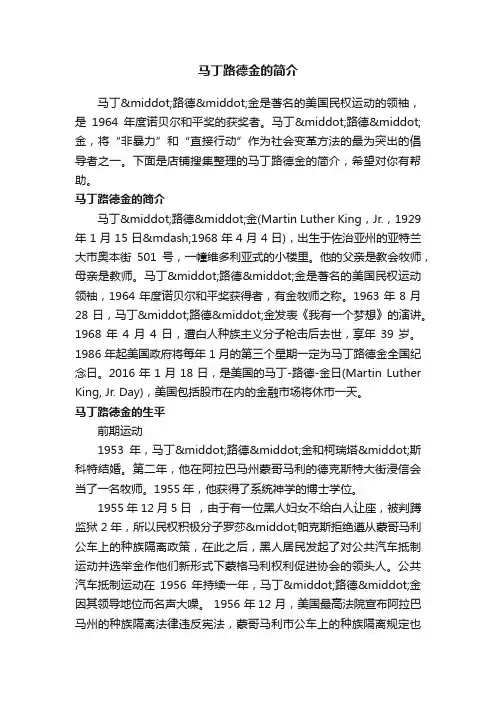
马丁路德金的简介马丁·路德·金是著名的美国民权运动的领袖,是1964年度诺贝尔和平奖的获奖者。
马丁·路德·金,将“非暴力”和“直接行动”作为社会变革方法的最为突出的倡导者之一。
下面是店铺搜集整理的马丁路德金的简介,希望对你有帮助。
马丁路德金的简介马丁·路德·金(Martin Luther King,Jr.,1929年1月15日—1968年4月4日),出生于佐治亚州的亚特兰大市奥本街501号,一幢维多利亚式的小楼里。
他的父亲是教会牧师,母亲是教师。
马丁·路德·金是著名的美国民权运动领袖,1964年度诺贝尔和平奖获得者,有金牧师之称。
1963年8月28日,马丁·路德·金发表《我有一个梦想》的演讲。
1968年4月4日,遭白人种族主义分子枪击后去世,享年39岁。
1986年起美国政府将每年1月的第三个星期一定为马丁路德金全国纪念日。
2016年1月18日,是美国的马丁-路德-金日(Martin Luther King, Jr. Day),美国包括股市在内的金融市场将休市一天。
马丁路德金的生平前期运动1953年,马丁·路德·金和柯瑞塔·斯科特结婚。
第二年,他在阿拉巴马州蒙哥马利的德克斯特大街浸信会当了一名牧师。
1955年,他获得了系统神学的博士学位。
1955年12月5日,由于有一位黑人妇女不给白人让座,被判蹲监狱2年,所以民权积极分子罗莎·帕克斯拒绝遵从蒙哥马利公车上的种族隔离政策,在此之后,黑人居民发起了对公共汽车抵制运动并选举金作他们新形式下蒙格马利权利促进协会的领头人。
公共汽车抵制运动在1956 年持续一年,马丁·路德·金因其领导地位而名声大噪。
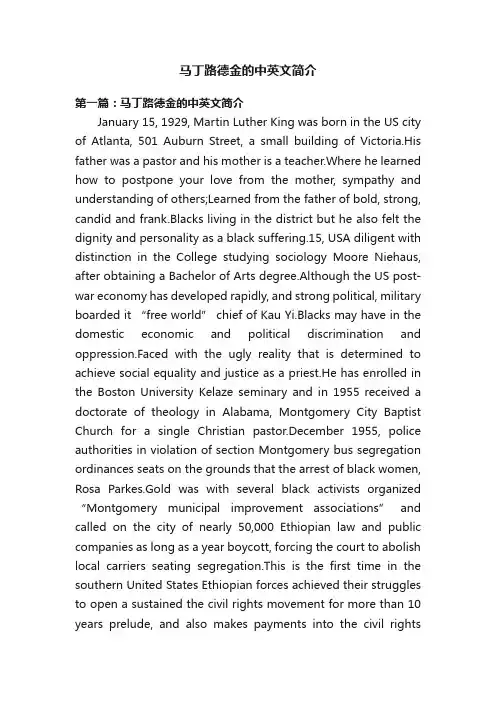
马丁路德金的中英文简介第一篇:马丁路德金的中英文简介January 15, 1929, Martin Luther King was born in the US city of Atlanta, 501 Auburn Street, a small building of Victoria.His father was a pastor and his mother is a teacher.Where he learned how to postpone your love from the mother, sympathy and understanding of others;Learned from the father of bold, strong, candid and frank.Blacks living in the district but he also felt the dignity and personality as a black suffering.15, USA diligent with distinction in the College studying sociology Moore Niehaus, after obtaining a Bachelor of Arts degree.Although the US post-war economy has developed rapidly, and strong political, military boarded it “free world” chief of Kau Yi.Blacks may have in the domestic economic and political discrimination and oppression.Faced with the ugly reality that is determined to achieve social equality and justice as a priest.He has enrolled in the Boston University Kelaze seminary and in 1955 received a doctorate of theology in Alabama, Montgomery City Baptist Church for a single Christian pastor.December 1955, police authorities in violation of section Montgomery bus segregation ordinances seats on the grounds that the arrest of black women, Rosa Parkes.Gold was with several black activists organized “Montgomery municipal improvement associations” and called on the city of nearly 50,000 Ethiopian law and public companies as long as a year boycott, forcing the court to abolish local carriers seating segregation.This is the first time in the southern United States Ethiopian forces achieved their struggles to open a sustained the civil rights movement for more than 10 years prelude, and also makes payments into the civil rightsmovement leader Dr.training.April 4, 1968, the ethnic elements were assassinated.The US government, from 1986 onwards, the annual January 3 Monday for Martin Luther King National Day.第二篇:马丁路德金中英文对照读完,他给我的第一感觉就是他是一个英雄,一个民族英雄。
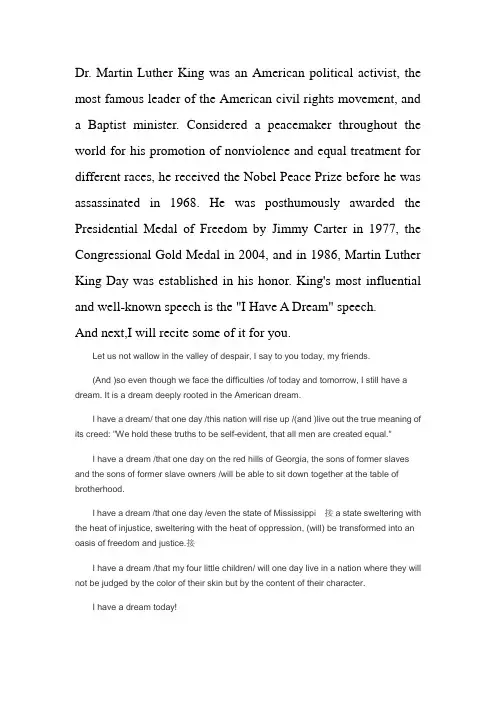
Dr. Martin Luther King was an American political activist, the most famous leader of the American civil rights movement, and a Baptist minister. Considered a peacemaker throughout the world for his promotion of nonviolence and equal treatment for different races, he received the Nobel Peace Prize before he was assassinated in 1968. He was posthumously awarded the Presidential Medal of Freedom by Jimmy Carter in 1977, the Congressional Gold Medal in 2004, and in 1986, Martin Luther King Day was established in his honor. King's most influential and well-known speech is the "I Have A Dream" speech.And next,I will recite some of it for you.Let us not wallow in the valley of despair, I say to you today, my friends.(And )so even though we face the difficulties /of today and tomorrow, I still have a dream. It is a dream deeply rooted in the American dream.I have a dream/ that one day /this nation will rise up /(and )live out the true meaning of its creed: "We hold these truths to be self-evident, that all men are created equal."I have a dream /that one day on the red hills of Georgia, the sons of former slaves and the sons of former slave owners /will be able to sit down together at the table of brotherhood.I have a dream /that one day /even the state of Mississippi 接a state sweltering with the heat of injustice, sweltering with the heat of oppression, (will) be transformed into an oasis of freedom and justice.接I have a dream /that my four little children/ will one day live in a nation where they will not be judged by the color of their skin but by the content of their character.I have a dream today!I have a dream that one day, /down in Alabama, with its vicious racists, with its governor /having his lips dripping with the words of "interposition" and "nullification" -/- one day right there in Alabama little black boys and black girls will be able to join hands with (little )white boys and white girls as sisters and brothers.接I have a dream today!I have a dream that one day every valley shall be exalted, and every hill and mountain shall be made low, the rough places will be made plain, and the crooked places will be made straight; "and the glory of the Lord shall be revealed and all flesh /shall see it together."?。
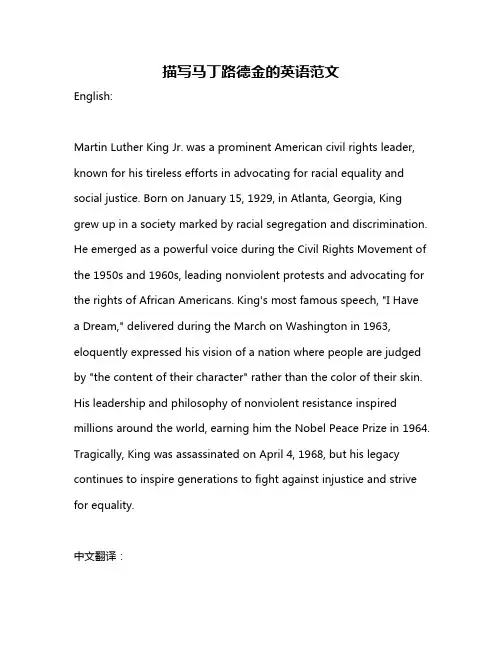
描写马丁路德金的英语范文English:Martin Luther King Jr. was a prominent American civil rights leader, known for his tireless efforts in advocating for racial equality and social justice. Born on January 15, 1929, in Atlanta, Georgia, King grew up in a society marked by racial segregation and discrimination. He emerged as a powerful voice during the Civil Rights Movement of the 1950s and 1960s, leading nonviolent protests and advocating for the rights of African Americans. King's most famous speech, "I Have a Dream," delivered during the March on Washington in 1963, eloquently expressed his vision of a nation where people are judged by "the content of their character" rather than the color of their skin. His leadership and philosophy of nonviolent resistance inspired millions around the world, earning him the Nobel Peace Prize in 1964. Tragically, King was assassinated on April 4, 1968, but his legacy continues to inspire generations to fight against injustice and strive for equality.中文翻译:马丁·路德·金是一位杰出的美国民权领袖,以他不懈的努力倡导种族平等和社会正义而闻名。
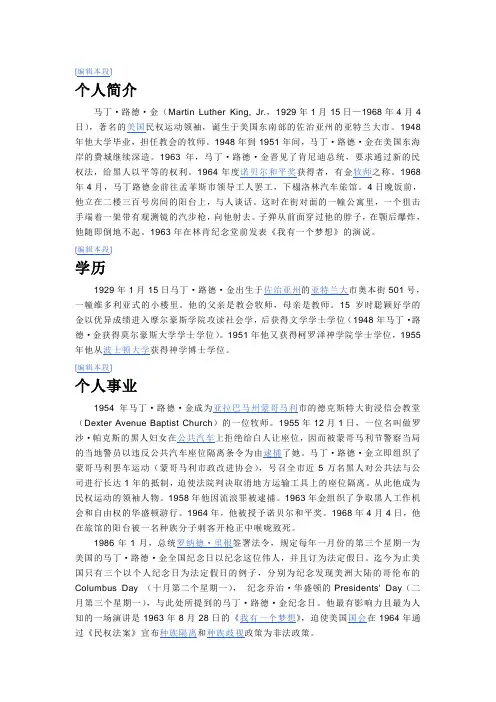
[编辑本段]个人简介马丁·路德·金(Martin Luther King, Jr.,1929年1月15日—1968年4月4日),著名的美国民权运动领袖,诞生于美国东南部的佐治亚州的亚特兰大市。
1948年他大学毕业,担任教会的牧师。
1948年到1951年间,马丁·路德·金在美国东海岸的费城继续深造。
1963年,马丁·路德·金晋见了肯尼迪总统,要求通过新的民权法,给黑人以平等的权利。
1964年度诺贝尔和平奖获得者,有金牧师之称。
1968年4月,马丁路德金前往孟菲斯市领导工人罢工,下榻洛林汽车旅馆。
4日晚饭前,他立在二楼三百号房间的阳台上,与人谈话。
这时在街对面的一幢公寓里,一个狙击手端着一架带有观测镜的汽步枪,向他射去。
子弹从前面穿过他的脖子,在颚后爆炸,他随即倒地不起。
1963年在林肯纪念堂前发表《我有一个梦想》的演说。
[编辑本段]学历1929年1月15日马丁·路德·金出生于佐治亚州的亚特兰大市奥本街501号,一幢维多利亚式的小楼里。
他的父亲是教会牧师,母亲是教师。
15岁时聪颖好学的金以优异成绩进入摩尔豪斯学院攻读社会学,后获得文学学士学位(1948年马丁·路德·金获得莫尔豪斯大学学士学位)。
1951年他又获得柯罗泽神学院学士学位,1955年他从波士顿大学获得神学博士学位。
[编辑本段]个人事业1954年马丁·路德·金成为亚拉巴马州蒙哥马利市的德克斯特大街浸信会教堂(Dexter Avenue Baptist Church)的一位牧师。
1955年12月1日,一位名叫做罗沙·帕克斯的黑人妇女在公共汽车上拒绝给白人让座位,因而被蒙哥马利节警察当局的当地警员以违反公共汽车座位隔离条令为由逮捕了她。
马丁·路德·金立即组织了蒙哥马利罢车运动(蒙哥马利市政改进协会),号召全市近5万名黑人对公共法与公司进行长达1年的抵制,迫使法院判决取消地方运输工具上的座位隔离。
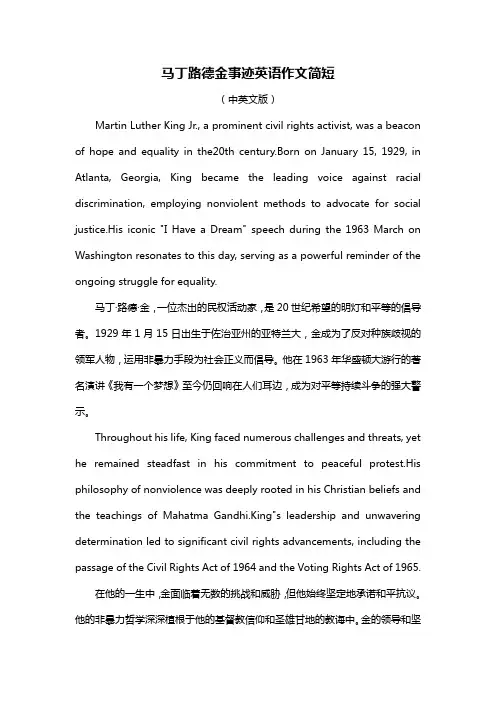
马丁路德金事迹英语作文简短(中英文版)Martin Luther King Jr., a prominent civil rights activist, was a beacon of hope and equality in the20th century.Born on January 15, 1929, in Atlanta, Georgia, King became the leading voice against racial discrimination, employing nonviolent methods to advocate for social justice.His iconic "I Have a Dream" speech during the 1963 March on Washington resonates to this day, serving as a powerful reminder of the ongoing struggle for equality.马丁·路德·金,一位杰出的民权活动家,是20世纪希望的明灯和平等的倡导者。
1929年1月15日出生于佐治亚州的亚特兰大,金成为了反对种族歧视的领军人物,运用非暴力手段为社会正义而倡导。
他在1963年华盛顿大游行的著名演讲《我有一个梦想》至今仍回响在人们耳边,成为对平等持续斗争的强大警示。
Throughout his life, King faced numerous challenges and threats, yet he remained steadfast in his commitment to peaceful protest.His philosophy of nonviolence was deeply rooted in his Christian beliefs and the teachings of Mahatma Gandhi.King"s leadership and unwavering determination led to significant civil rights advancements, including the passage of the Civil Rights Act of 1964 and the Voting Rights Act of 1965.在他的一生中,金面临着无数的挑战和威胁,但他始终坚定地承诺和平抗议。
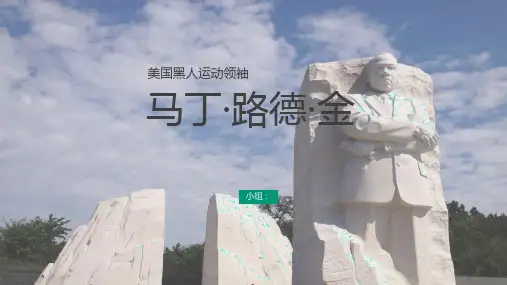
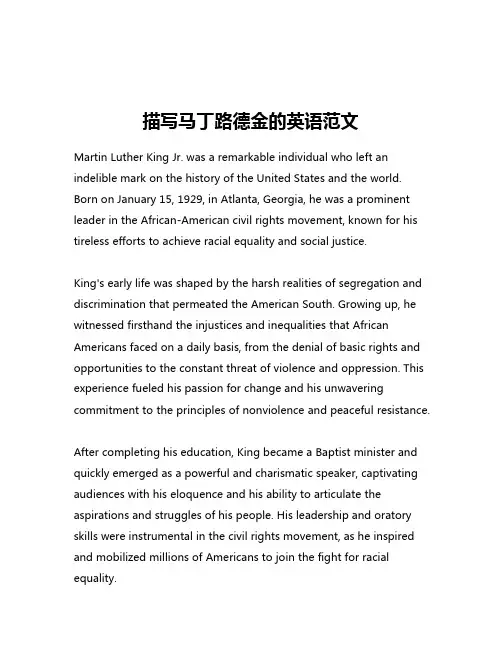
描写马丁路德金的英语范文Martin Luther King Jr. was a remarkable individual who left an indelible mark on the history of the United States and the world. Born on January 15, 1929, in Atlanta, Georgia, he was a prominent leader in the African-American civil rights movement, known for his tireless efforts to achieve racial equality and social justice.King's early life was shaped by the harsh realities of segregation and discrimination that permeated the American South. Growing up, he witnessed firsthand the injustices and inequalities that African Americans faced on a daily basis, from the denial of basic rights and opportunities to the constant threat of violence and oppression. This experience fueled his passion for change and his unwavering commitment to the principles of nonviolence and peaceful resistance.After completing his education, King became a Baptist minister and quickly emerged as a powerful and charismatic speaker, captivating audiences with his eloquence and his ability to articulate the aspirations and struggles of his people. His leadership and oratory skills were instrumental in the civil rights movement, as he inspired and mobilized millions of Americans to join the fight for racial equality.One of the defining moments in King's life was the Montgomery bus boycott, which began in 1955 and lasted for over a year. This protest, sparked by the arrest of Rosa Parks for refusing to give up her seat on a segregated bus, was a pivotal event in the civil rights movement. King's leadership and organizational skills were crucial in sustaining the boycott, which ultimately led to the desegregation of public transportation in Montgomery.In the years that followed, King continued to be at the forefront of the civil rights struggle, participating in numerous marches, sit-ins, and other nonviolent demonstrations. His most famous speech, "I Have a Dream," delivered during the March on Washington in 1963, is widely regarded as one of the most powerful and inspiring addresses in American history. In this speech, King articulated his vision of a future where people would be judged not by the color of their skin, but by the content of their character.King's commitment to nonviolence and his belief in the transformative power of love and compassion were central to his philosophy and his approach to social change. He understood that the struggle for civil rights was not just a political battle, but a moral and spiritual one as well. Through his speeches, writings, and actions, he sought to inspire and uplift people, to awaken their conscience, and to challenge them to confront the injustices and inequalities thatpermeated society.Despite the many obstacles and challenges he faced, King remained steadfast in his pursuit of justice and equality. He was arrested numerous times, subjected to physical attacks, and even faced the threat of assassination, but he never wavered in his commitment to the cause. His unwavering courage, his moral clarity, and his unwavering faith in the power of nonviolence to bring about change made him a true hero and a symbol of hope for millions of people around the world.Tragically, King's life was cut short when he was assassinated on April 4, 1968, in Memphis, Tennessee. His death was a profound loss for the civil rights movement and for the nation as a whole, but his legacy and his vision continue to inspire and guide us today.In the decades since his death, King's impact has only grown stronger and more enduring. He is widely regarded as one of the greatest leaders in American history, and his message of equality, justice, and nonviolence has resonated with people of all backgrounds and beliefs. His birthday is now a national holiday in the United States, and his words and deeds continue to be celebrated and honored around the world.Indeed, Martin Luther King Jr. was a truly remarkable individualwhose life and work have left an indelible mark on the history of the United States and the world. His unwavering commitment to the principles of nonviolence and his tireless efforts to achieve racial equality and social justice have made him a true hero and an inspiration to people of all ages and backgrounds. As we reflect on his life and legacy, we are reminded of the power of courage, compassion, and the unwavering pursuit of justice to transform the world and create a better future for all.。
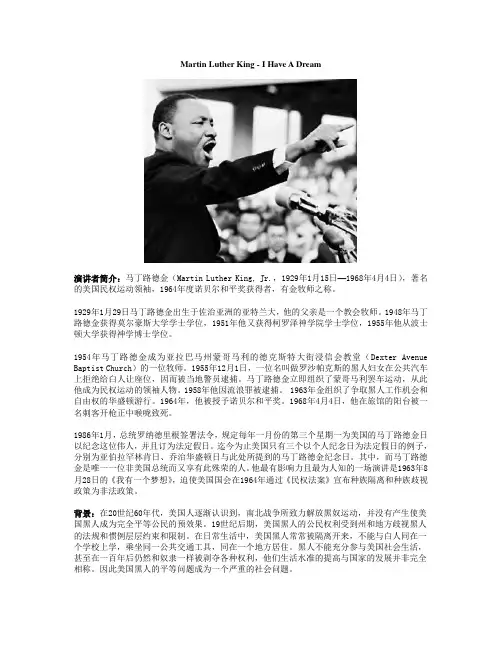
Martin Luther King - I Have A Dream演讲者简介:马丁路德金(Martin Luther King, Jr.,1929年1月15日—1968年4月4日),著名的美国民权运动领袖,1964年度诺贝尔和平奖获得者,有金牧师之称。
1929年1月29日马丁路德金出生于佐治亚洲的亚特兰大,他的父亲是一个教会牧师。
1948年马丁路德金获得莫尔豪斯大学学士学位,1951年他又获得柯罗泽神学院学士学位,1955年他从波士顿大学获得神学博士学位。
1954年马丁路德金成为亚拉巴马州蒙哥马利的德克斯特大街浸信会教堂(Dexter Avenue Baptist Church)的一位牧师。
1955年12月1日,一位名叫做罗沙帕克斯的黑人妇女在公共汽车上拒绝给白人让座位,因而被当地警员逮捕。
马丁路德金立即组织了蒙哥马利罢车运动,从此他成为民权运动的领袖人物。
1958年他因流浪罪被逮捕。
1963年金组织了争取黑人工作机会和自由权的华盛顿游行。
1964年,他被授予诺贝尔和平奖。
1968年4月4日,他在旅馆的阳台被一名刺客开枪正中喉咙致死。
1986年1月,总统罗纳德里根签署法令,规定每年一月份的第三个星期一为美国的马丁路德金日以纪念这位伟人,并且订为法定假日。
迄今为止美国只有三个以个人纪念日为法定假日的例子,分别为亚伯拉罕林肯日、乔治华盛顿日与此处所提到的马丁路德金纪念日。
其中,而马丁路德金是唯一一位非美国总统而又享有此殊荣的人。
他最有影响力且最为人知的一场演讲是1963年8月28日的《我有一个梦想》,迫使美国国会在1964年通过《民权法案》宣布种族隔离和种族歧视政策为非法政策。
背景:在20世纪60年代,美国人逐渐认识到,南北战争所致力解放黑奴运动,并没有产生使美国黑人成为完全平等公民的预效果。
19世纪后期,美国黑人的公民权利受到州和地方歧视黑人的法规和惯例层层约束和限制。
在日常生活中,美国黑人常常被隔离开来,不能与白人同在一个学校上学,乘坐同一公共交通工具,同在一个地方居住。
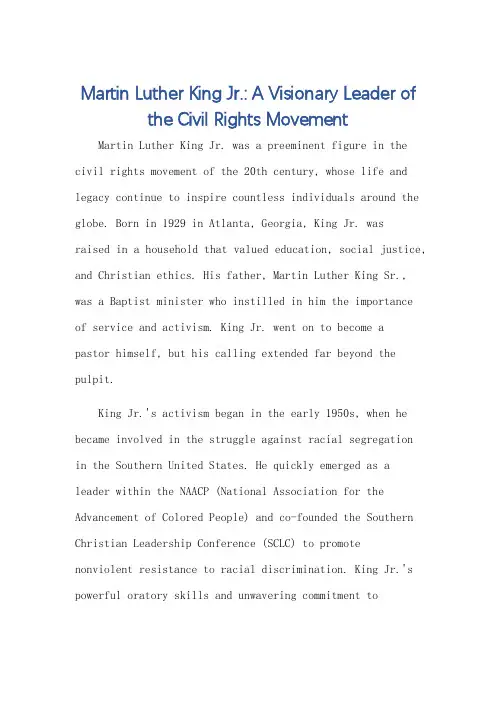
Martin Luther King Jr.: A Visionary Leader of the Civil Rights MovementMartin Luther King Jr. was a preeminent figure in the civil rights movement of the 20th century, whose life and legacy continue to inspire countless individuals around the globe. Born in 1929 in Atlanta, Georgia, King Jr. wasraised in a household that valued education, social justice, and Christian ethics. His father, Martin Luther King Sr., was a Baptist minister who instilled in him the importanceof service and activism. King Jr. went on to become apastor himself, but his calling extended far beyond the pulpit.King Jr.'s activism began in the early 1950s, when he became involved in the struggle against racial segregationin the Southern United States. He quickly emerged as a leader within the NAACP (National Association for the Advancement of Colored People) and co-founded the Southern Christian Leadership Conference (SCLC) to promotenonviolent resistance to racial discrimination. King Jr.'s powerful oratory skills and unwavering commitment tojustice made him a symbol of hope and resilience for the oppressed African American community.King Jr.'s most famous speech, delivered in Washington, D.C. on August 28, 1963, was a clarion call for freedom and equality. In his "I Have a Dream" speech, he envisioned a future where race would no longer be a barrier toopportunity and where all people would be judged not by the color of their skin but by the content of their character. His words resonated deeply with the American people and helped to galvanize support for the civil rights movement.Despite facing constant threats and harassment, King Jr. remained resolute in his commitment to nonviolent protest. However, his life was tragically cut short on April 4, 1968, when he was assassinated in Memphis, Tennessee. His death sent shockwaves through the nation and sparked a new waveof activism and protests.In the decades since his passing, King Jr.'s influence has only grown. He has become a symbol of courage, determination, and the power of peaceful protest. Hislegacy lives on in the countless individuals who have been inspired by his life and work to continue the fight forsocial justice and equality. Martin Luther King Jr. remains a beacon of hope for people around the world who strive for a more just and equitable society.**马丁·路德·金:民权运动的远见卓识领袖**马丁·路德·金是20世纪民权运动中的一位杰出人物,他的生命和遗产继续激励着全球无数的人们。
马丁路德金故事马丁·路德·金(Martin Luther King)是美国历史上最伟大的民权运动领袖之一,他以非暴力抗议和坚定的信念,为非裔美国人争取平等权利和尊严,成为了世界历史上的一位伟大人物。
马丁·路德·金出生于1929年1月15日,他在亚特兰大长大,并在那里接受了良好的教育。
在他年轻的时候,他就对种族歧视和不公平现象产生了深刻的认识,这种认识成为了他后来奋斗的动力。
他在蒙哥马利市的公交车上被迫站立而不得不让座给白人的事件,成为了他人生中的转折点。
这一事件让他决心要为黑人争取平等权利,开始了他的民权运动之路。
马丁·路德·金在1955年领导了著名的蒙哥马利公交车抵制运动,这场运动最终导致了南方种族隔离法庭宣告非法。
在这场运动中,马丁·路德·金提倡非暴力抗议,他的领导和组织能力使得运动取得了巨大的成功,也让他成为了美国民权运动的领袖人物。
1963年,马丁·路德·金在华盛顿林肯纪念堂前发表了著名的《我有一个梦想》演讲,这个演讲成为了美国历史上最伟大的演讲之一。
在演讲中,他呼吁结束种族歧视,实现黑人和白人的平等,这个演讲也让他成为了世界民权运动的象征。
然而,马丁·路德·金的生命并不长久,1968年4月4日,他在孟菲斯的一次演讲后遭到枪击身亡,年仅39岁。
他的离世让整个世界都为之震惊和悲痛,但他的精神和理念却永远留存在人们心中。
马丁·路德·金的故事告诉我们,一个人的力量是有限的,但当人们团结起来,共同为正义和平等而奋斗时,就能改变世界。
他的非暴力抗议和坚定信念,激励着世界上无数的人们,成为了历史的光辉。
马丁·路德·金的故事,不仅是美国历史上的一段佳话,更是全世界人民共同的记忆。
他用自己的生命诠释了对正义和平等的追求,成为了世界上最伟大的民权运动领袖之一。
马丁路德金美国民权运动的领袖马丁·路德·金(Martin Luther King Jr.)是20世纪美国历史上最杰出的民权运动领袖之一。
他不仅以非暴力抗议和平民主斗争的方式争取黑人平等权益,也倡导全人类的公正和和平。
马丁·路德·金的人生故事激励了无数人,他对美国的民权运动产生了深远的影响。
马丁·路德·金于1929年1月15日出生在美国乔治亚州亚特兰大。
他出生在一个信奉基督教的家庭,受到父亲的深刻影响。
在他成长的过程中,他经常目睹黑人遭受到的种种不公正对待,这进一步强化了他开始争取平等的决心。
马丁·路德·金在20世纪50年代中期开始活跃于民权运动。
他从孟买大学获得神学博士学位后,成为阿拉巴马州蒙哥马利市黑人教会的牧师。
在1955年,他领导了著名的蒙哥马利公交车抵制行动,这是他第一次引起全国关注。
这次抵制行动是对公交系统种族隔离政策的战斗。
马丁·路德·金鼓励黑人们拒绝乘坐公交车,这项抗议行动最终使得美国最高法院宣布种族隔离政策违宪。
这次抗议行动的成功使马丁·路德·金成为民权运动领袖,并奠定了他在改变美国社会的地位。
在接下来的几年里,马丁·路德·金继续领导抗议行动,目标是消除针对黑人的种族隔离与不公。
他以非暴力的方式组织示威游行、抵制和反对种族隔离政策,这一系列抗议活动引起了全国关注。
1963年,马丁·路德·金在华盛顿特区的林肯纪念堂前发表了著名的演讲《我有一个梦想》。
这次演讲成为了美国历史上最具影响力的演讲之一,马丁·路德·金在演讲中呼吁平等和公正,并表达了对一个无分种族的美国前景的愿景。
1964年,马丁·路德·金获得了诺贝尔和平奖,以表彰他在民权运动中的非暴力斗争。
他成为美国历史上最年轻的诺贝尔和平奖得主。